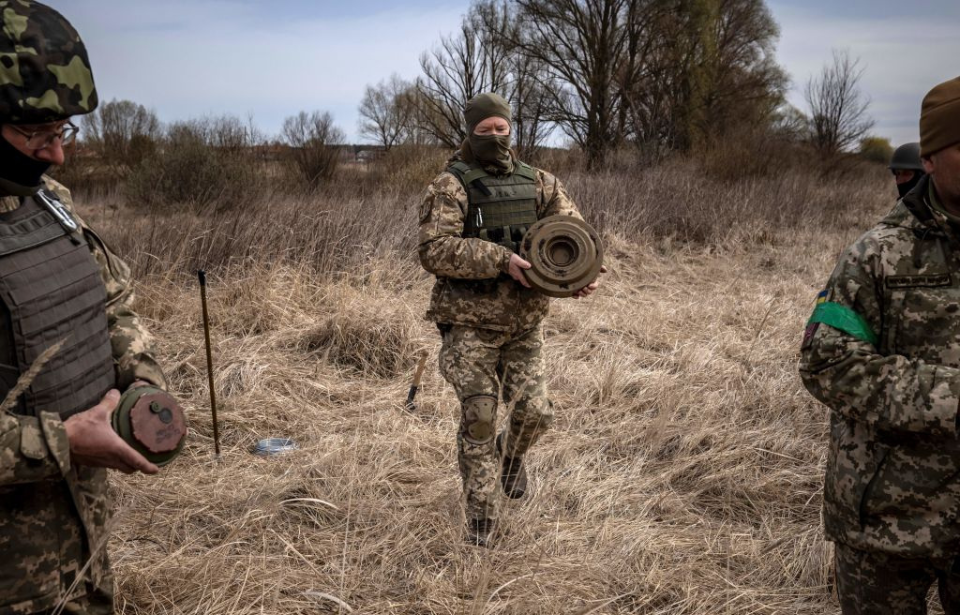Since the invasion of Ukraine in February 2022, land mines have been laid by Russians soldiers, leading to a high number of civilian casualties. They’ve also disrupted food chains. While both sides have used anti-tank mines, the Russians have also laid anti-personnel ones, which were banned by the United Nations in 1997.
Some of the places with the highest numbers of mines are farmers’ fields, and one US Army Special Forces veteran has taken matters into his own hands. Ryan Hendrickson, a Green Beret with experience clearing mines, has repeatedly traveled to Ukraine to help clear areas of these dangerous explosives.
Ryan Hendrickson’s service in Afganistan
Sergeant First Class Ryan Hendrickson initially completed enlistments with both the US Navy and Air Force, before transferring to the Army in 2008. During his service with the US military, he was deployed a number of times places such as Iraq, South and Central America, and Afghanistan.
As a Green Beret in Afghanistan, he was tasked with clearing routes of improvised explosive devices (IEDs) while his 12-man team were on combat missions. In 2010, however, he stepped on one with his right foot while trying to rescue an Afghan soldier and the device exploded. This left “his foot dangling at the end of his leg.”
Skin grafts to his lower leg and right foot allowed the two parts to be reattached. Although he was medically retired following his injury, Hendrickson wanted to return to active duty. This required him to undergoing multiple surgeries, partake in rehabilitation and pass a number of physical tests.
He was successful, and redeployed to Afghanistan in 2012. Among his most notable and selfless actions during the latter part of his service was the rescue of three live and retrieval of two dead Afghan soldiers during a firefight with the enemy. At the time, he was serving with B Company, 2nd Battalion, 7th Special Forces Group and was in charge of an Afghan IED clearance unit, which was part of the National Mine Reduction Group.
For his service with the military, Hendrickson was awarded the Silver Star, four Bronze Stars, a Purple Heart and an Army Commendation Medal with Valor.
Volunteering his services in Ukraine
With an impressive 13 years of experience as a US Army Special Forces Engineer, Hendrickson opted travel to Ukraine in March 2022 with a humanitarian group, just a few weeks into the Russo-Ukrainian War. A few months later, in August 2022, he returned. On both occasions, he worked to clear mines, usually from fields, so farmers could continue to plant and harvest their crops.
However, that wasn’t his initial intention. When he first traveled overseas, his aim was to deliver medical supplies, food and water to those in need. While there, the group began to evacuate people from combat zones, which is when Hendrickson realized how many mines had been placed around the country. “Everywhere I went the landmine situation was crazy,” he told Task & Purpose.
In the interview with Task & Purpose, Hendrickson spoke about his experience in Ukraine. At the time of the interview, he and his team of two locals were working in the central part of the country and had been at it for seven days straight. He sometimes worked alone, when his teammates were pulled away for other jobs.
Throughout his time in Ukraine thus far, the group has cleared a staggering 344 mines by walking through fields with mine detectors.
Clearing Russian land mines
Hendrickson told Newsy that land mines are typically left behind by Russian troops when they’re forced to abandon an area, which causes problems when civilians return home.
“They’re trying to rebuild as quick as they can so they so they can last the winter,” he said. “The civilian casualty rate for mine inflicted injuries is skyrocketing right now because they’re in a rush to harvest because September is sunflower harvest month. They’re trying to get back out to their fields.”
In his own words, “I figured I can make quite a bit of difference doing what I’m doing without pulling a trigger, helping out the farmers and the civilians and all of that. People who come over here to fight, my hat’s off to them, be safe. My life revolves more around helping and trying to make a difference that way.”
More from us: Ukrainian Military Using Virtual Simulators to Train Volunteer Fighters
Hendrickson plans to return to Ukraine again in the future, but feels like he shouldn’t “press his luck” by staying too long. In his visits there so far, he’s figured out ways to make his future trips more time efficient, cutting down the amount of time it takes him to get to different fields.
